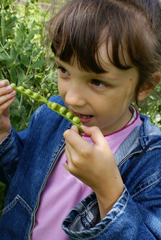
Against a backdrop of global food shortages and the spectre of five dollar lettuce at the checkout, there are signs that more Western Canadians are tearing up their lawns this spring to plant vegetable gardens.
It's still early in the planting season, but the region's organic-seed distributors report a dramatic increase in business.
"We put out the catalog at the beginning of January, as we always do" says Jeanette McCall, a sales representative at West Coast Seeds, based in Delta, B.C.
"Then, boom. We had many, many, many more orders than we anticipated. [Our computer system] simply couldn't handle the load," she adds. "It just sort of crashed."
It's the same story at Salt Spring Seeds, which specializes in heritage and heirloom vegetable varieties.
"I've never seen the likes of this in over 20 years of selling seeds," confirmed owner Dan Jason.
"The phone calls, e-mails, letters, seed orders are relentless. Everyone wants to grow food now. So many people are attempting gardens for the first time."
Meanwhile, Helene Waugh, co-owner of Sea Soil, a popular brand of bagged organic compost made in Port McNeil, on northern Vancouver Island, says that her business has "increased dramatically" over last year.
"We can't keep up," Waugh says.
'I think they get it'
McCall reports that her company, which was launched a quarter-century back, has seen "many thousands" of new customers this spring, and that staff are working seven days a week to process orders manually.
"We typically sell to people who own their own home, but this is different. These are young people who are very interested in food gardening. I think they get it."
What they're getting, local-eating advocates say, is a clearer picture of the connections between food, climate, and petroleum -- driven by news of an emerging global food crisis.
The current shortages are driven by a combination of factors, including the high price of oil, unusually severe weather impacting crops, population growth, and the conversion of maize into biofuels. Though the pinch has yet to be widely felt in Canada, reports are emerging in the United States that some big-box retailers are apparently limiting sales of rice.
All of this uncertainty is manifesting itself in a renewed and expanded commitment to locavorism, says Alisa Smith, co-author with James MacKinnon of the national best-seller 100 Mile Diet, which grew out of their series launched on The Tyee.
"We have seen a steady increase in the number of subscribers to the 100-Mile Diet Society web site over the last two years, with B.C. our single biggest block of people and Vancouver the largest city in terms of subscribers in North America," reports Smith.
'Zero Mile Diet'
The director of a Vancouver non-profit urban-agriculture group suggests that the eat-local movement may have reached a new tipping point.
"There is definitely a buzz and an interest," observes City Farmer's Michael Levenston. "We are busy seven days a week; our classes are full, our phone is ringing. There is certainly a great interest generated in city farming and urban agriculture."
"Someone here said, 'This is trendy,' and trendy can be a good thing," adds Levenston. "There may be a new generation of food gardeners, and I think that's very exciting."
Salt Spring Seeds owner Dan Jason is equally stoked to be riding the home-grown wave. Jason has completely sold out his stock of "Zero Mile Diet" seed kits -- a collection of bean, grain, and other seeds tailored to help this region's people grow most of their own food.
"Enormous changes are afoot," he says.
Related Tyee stories:
- Lure of the Urban Veggie Garden
Digging for love, money, fame and sex appeal. - Let's Pave Streets Green
Would you give up your extra parking spot for a garden plot? - Social Fertilizer
The big growth potential of urban agriculture.
Read more: Food, Environment















Tyee Commenting Guidelines
Comments that violate guidelines risk being deleted, and violations may result in a temporary or permanent user ban. Maintain the spirit of good conversation to stay in the discussion.
*Please note The Tyee is not a forum for spreading misinformation about COVID-19, denying its existence or minimizing its risk to public health.
Do:
Do not: